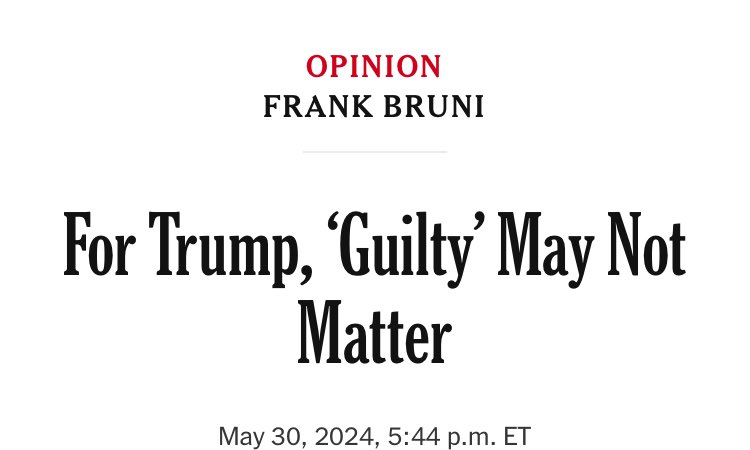[We dive a bit deeper into "what is intuitive? in the comments.]
A few years ago, a Doctor Who episode had the doctor (or more accurately a doctor) figure out that he and everyone around him were simulations because, when asked to name a number, everyone independently always came up with the same answer. (Yes, I have questions about that too, but it's a fun story. Just go with it.) I got to thinking about that plot device Thursday afternoon when multiple sources started popping up with headlines like this:
If you gathered together a group of people and told them that a presidential candidate had been convicted of multiple felonies six weeks before the nominating convention, you wouldn't expect them to all instantly declare that the conviction would have no impact on the upcoming election. Don't get me wrong. It could well be true, but that's not what you'd expect the immediate consensus to be.
And, yes, I know what you're going to say. Trump. Normalization. Everything's different now. But is that true? He was still something of an unknown entity in 2016. Since then, he lost both the popular vote in the electoral college in 2020 and his party either lost or at least underperformed in both midterms. That at least opens up the possibility of electoral consequences for Trump's misbehavior. What's more we have considerable data indicating that being convicted would have a negative impact on Trump's campaign including a sizable protest vote and poll respondents saying that convictions would make them less likely to support the man.
Should we trust that data? I don't know. Some analysts have argued that Trump's protest vote isn't actually that big (I'm not convinced by these analyses, but it's possible I'm wrong). Polling about future actions given hypothetical situations is always questionable. So it's not that this is unassailable; it's that the evidence on the other side the proposition is no better and is possibly even weaker. Other than the fundraising bump (at least some of which will be going toward legal fees), I'm not sure what evidence suggests that this won't have a negative effect on independents or wobbly Republicans. To the extent that there is a preponderance of evidence, it would seem to support the strongly intuitive conclusion that being a scandal-ridden convicted felon is bad for a politician.
I realize some of you out there might disagree with some, perhaps even most of these assertions, but that's not really the point. If we were seeing some pundits and journalists think the problem through then come to the conclusion that the ruling will have no impact (at least no negative impact), while others concluded it will hurt Trump (though possibly not enough to decide in the election), and hopefully a few would defer taking a position until they had more data, I could understand. This is a confusing situation, unprecedented along the number of dimensions, with plenty of conflicting information, misinformation, and disinformation to be dealt with. Any of those conclusions or non-conclusions could be justified.
But that's not what we saw.
Instead, with in a matter of hours, the mainstream, respectable press largely converged on the same somewhat counterintuitive narrative. There was no time to accumulate actual data about how people were responding, no time for opinion makers to ask themselves if the reality was somehow different than the scenarios they considered, no time to think.
If we had a press corps made up of independent-minded people trying to digest information, analyze it, and yes form narratives, but narratives that are evidence-based and data-driven, this would not happen. Instead, the discourse is driven by publications like the New York Times and Politico which appear to be guided by herd mentality and cowardice.
Or we're in the simulation. Believe whichever one gives you the most comfort.
[Great Capaldi moment at the end.]

I'm not convinced it's as counterintuitive a narrative as you are describing it. The standard rejoinder to any "omg did you hear what he did this time?" has been "yeah, but it won't matter" for at least four years now. But I agree that the intuition may be wrong--he'll still get a depressingly large number of votes, but with thin electoral margins he wouldn't have to turn off too many people to turn a close race into a solid loss. -Jeff
ReplyDeleteI see your point, but I think a lot of this comes down to the difference between intuitive and normalized. I would define intuitive as something fairly stable, not strongly influenced by current events and conditioning. Any time before 2015, if you would have asked people would being convicted of multiple felonies make it more difficult for a former president to attempt to come back, pretty much everyone would've said that was obviously true. The majority of the press is now arriving at a consensus that would have struck them all as crazy just a few years ago. That's what I think is interesting here. -- MP
ReplyDelete